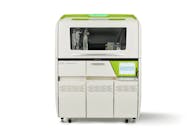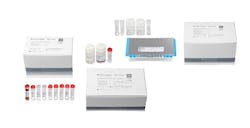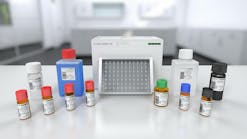Hamilton Storage and Rhinostics, an early-stage Harvard University spin-out company, announced the first step in a collaboration to improve decapping and accessioning of patient samples, according to a news release from Hamilton Storage.
These common bottlenecks occur during clinical sample processing of assays to detect antibodies and antigens in relation to the novel coronavirus, SARS-CoV-2, as well as many other pathogens. The agreement includes joining Hamilton Storage’s LabElite DeCapper with the RHINOstic swab collection device for hands-free and high throughput sample processing.
The patent-pending RHINOstic nasal and buccal swab collection device integrates a unique, polypropylene-based swab with an automatable cap. After the patient sample is collected, the swab is placed into a barcoded sample container and ready for dry shipment; bypassing the need for viral transport media (VTM). This reduces reagent costs as well as risks of leaking, accidental biohazard contact, and variability due to VTM composition. The lack of VTM also enables greater sample concentrations for use in such tests as PCR, next generation sequencing (NGS) and ELISA methods.
The LabElite DeCapper automates decapping and capping of tubes and vials with internal or external threads in 24-, 48-, or 96-tube racks. This increases sample processing speed while protecting users from biohazard exposure. When processing RHINOstic devices, the LabElite DeCapper’s 12-channel head and a conversion kit are required. This accessory is available with new models, and field-upgradeable for those with existing LabElite DeCappers.
The collaborative agreement will include co-promoting the RHINOstic device and LabElite DeCapper solution along with marketing and educational initiatives aimed at making customers aware of the increased convenience, speed, and consistency of the combined solution.





